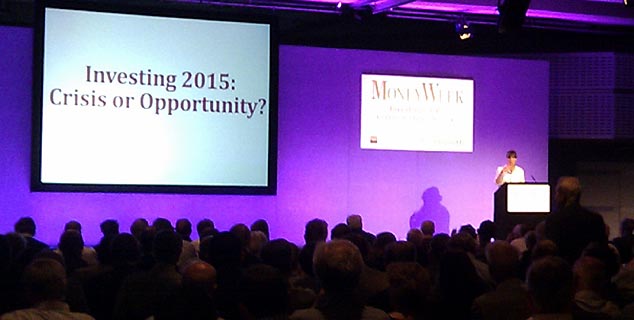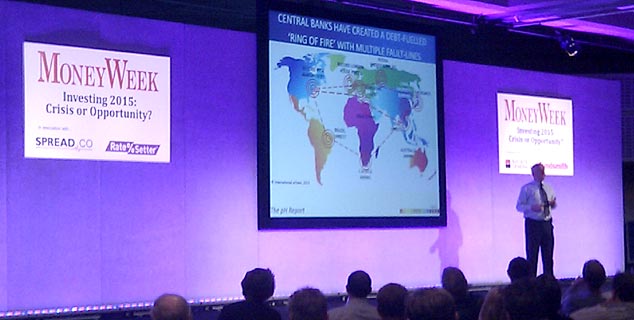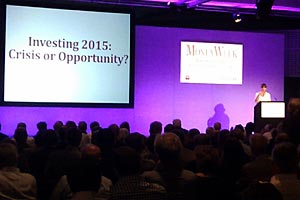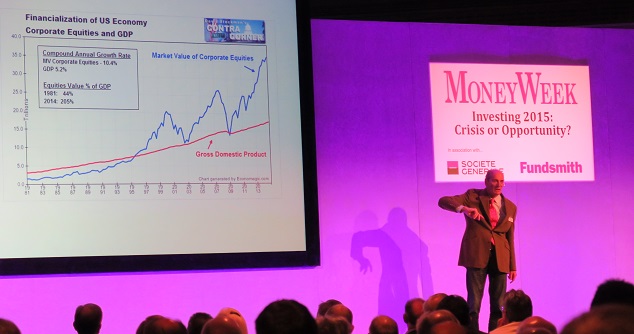Get the latest financial news, insights and expert analysis from our award-winning MoneyWeek team, to help you understand what really matters when it comes to your finances.
You are now subscribed
Your newsletter sign-up was successful
Want to add more newsletters?

Twice daily
MoneyWeek
Get the latest financial news, insights and expert analysis from our award-winning MoneyWeek team, to help you understand what really matters when it comes to your finances.

Four times a week
Look After My Bills
Sign up to our free money-saving newsletter, filled with the latest news and expert advice to help you find the best tips and deals for managing your bills. Start saving today!
09:00
Good morning to everyone from the MoneyWeek Conference 2015. It's an impressive turnout on a warm, muggy day here at the Queen Elizabeth II conference centre in Westminster. MoneyWeek's editor-in-chief, Merryn Somerset Webb, is getting us underway. She's getting the ball rolling, talking about one of her favourite subjects: pensions and annuities.
Remember, if you haven't been able to join us today, don't worry. All the action from the conference will be available to buy on DVD box-set.
MoneyWeek
Subscribe to MoneyWeek today and get your first six magazine issues absolutely FREE

Sign up to Money Morning
Don't miss the latest investment and personal finances news, market analysis, plus money-saving tips with our free twice-daily newsletter
Don't miss the latest investment and personal finances news, market analysis, plus money-saving tips with our free twice-daily newsletter

Archaeologists are excavating a medieval cemetery in Hereford, says Merryn. The women are local, but the men came from elsewhere. Evidence that non-dom status has been with us for a long, long time.
"Who here earns over £150,000", she asks. A few sheepish hands go up. "Come on" says Merryn. "We're all capitalists here!", prompting giggles from the audience.
In Japan, envelopes were once passed around as currency, says Merryn. It was assumed that inside the envelopes, there was money. Nobody ever opened the envelopes, because they trusted the system. If they had opened the envelopes and found no money inside, faith in the system would collapse. This is a bit like the situation Greece finds itself in. If people can't trust the banking / lending system, it could spell trouble for the Greeks and the euro.
Now we move onto property. By the way, MoneyWeek is 15 years old this year, and property has always been one of our favourite topics, as indeed, it is yours.
Japan has been one of MoneyWeek's favourite markets for a long time now. And we still like it, says Merryn. You only have to look at the Nikkei's (Japan's benchmark index) to see why. We've also been recommending China for about a year now, and the market there has really taken off recently.
Now is about as difficult as it has been to invest in the last 15 years. Another reason to hold some gold in your portfolio. Merryn ends her talk by showing us a sign from outside a local church: "Life is short. Pray hard".
09:45
Here comes Paul Hodges...

Paul is talking about how changing global demographics is changing the investing environment, and how this is something investors need to think about. Fertility rates have halved, and we're not going to reach the once-touted population figure of nine billion people. People are also living a lot longer, and Britain is no exception. That is prompting a change of tack from central banks around the world.
But he starts his speech by talking about smallpox... The disease was the greatest scourge of the modern age, but we eventually tamed it. Life expectancies have been increasing ever since, says Paul. That has led to baby booms but only 779,000 babies were born last year in Britain. That's going to be a problem, because that's going to hit consumption.You have to have 2.1 babies to replace the population. For the last 45 years, we've only been between 1.7 and 1.9. Fertility rates are collapsing.
The oldest 'boomer' is in his 60s that's a growth market, says Paul. We should be selling things that that age group can afford but Paul doesn't want to hear about zimmer frames. Many people are living longer, more active lives. That's a market companies will exploit. It's a question of affordability, not affordable luxury.
India's demograhics are fantastic, but you can't say that about China and Russia. Japan has had to rack up so much debt to support its ageing population. The point is, says Paul, often the wealth in richer countries with older populations is dependent on debt.
10:30
Paul Hodges concludes with a thought: In this new age, this 'new normal', we're all going to have to get used to more volatility.
Now for some questions from the audience...
How will the 'Great unwinding' affect bonds?
"I'm worried about bonds", says Paul. He doesn't want the government to redeem his gilt just as it's making money. The debt is too large, and we're seeing some major movements. "Liquidity in the market is being reduced and people are starting to ask some awkward questions... This isn't going to end well".
Another question from the audience:
"When will house prices halve? What time scales are we talking about?"
"If you believe the central bank will continue to print money, you can safely buy on the basis of the wealth effect", says Paul.But it's looking shaky, says Paul. He told his adult sons not to buy now.
Next up: Dr Pippa Malmgren oozing American charm.

She's going to tell us about what's going on in the world of policy markers and the world's largest investors. Exciting stuff. Her views are controversial, she says. The central banks are telling us there isn't any inflation. Actually there is a gap between stated figures, what people are really feeling and why that is sparking conflicts around the world.
There's a big fight going on between the Federal Reserve, Pippa tells us, and emerging market central banks - particularly with China on how to deal with debt. She knows what she's talking about - she's worked in the White House. Nobody expects Britain to not pay back what she owes - but, and this is crucial, there are many ways to default - some of them are quite sneeky.
10:45
Quantitative easing (QE) has contributed to the rising cost of living. And that has consequences, says Pippa. If you have assets and a lot of our audience do you will be happy. But a lot of people don't have assets.
That's going to lead to social unrest, says Pippa. We're already seeing higher levels of social protest in China and the Middle East where they're most sensitive to price moves.
China's recent island building in the South China Sea is an example of China trying to appease its citizens. It's after the gas to protect people from the price volatility of gas. The same goes for fishing.
The Fed's policies are very different, however, and that's sparking conflict with China.
11:00
The world is like a monopoly board. Russia wants to hold on to Ukraine because it is the fourth biggest food producer.
Pippa worked for the Reagan administration, and the tactic used by the US, she says, was to force the USSR to overspend on its armed forces, and then go bust. The West is playing the same game with Russia. But today's markets don't remember what it was like to live in a Cold War climate, and that scares them.
Pippa says the UK is a great place to be for tax purposes. "Don't choke", she tells the audience, she's serious prompting laughter around the room. But it's not for nothing people are heading to the UK. This is the land of financial freedom, as well as technological innovation and that's coming from an American!
11:15
Questions from the audience...
"Is artificial intelligence going to do us all out of a job?"
No, says Pippa. Robots are creating new jobs in a whole range of sectors. Innovation has never locked human beings out of the workplace - there will be displacement, but there always is. I choose to be an optimist, she says.
Let's hope she's right!
"Are we in danger of hyperinflation?"
Pippa doesn't think so. Innovation will hold down inflation. Janet Yellen (the Fed chief) would happily raise inflation to 3% just to even things out. Inflation has been so low for so long. But veteran Paul Volker says if central banks think they can control inflation, they're kidding themselves. Pippa likes Paul Volker, she tells us. He's been around for a long time.
11:30
Well, this morning has been packed full of useful insights from Merryn, Paul Hodges and Dr Pippa Malmgren. After a swift tea break, we're looking forward to plenty more to come.
11:45
First up, we have Dividend Letterwriter Stephen Bland, explaining everything you need to know about constructing a winning portfolio.

One of the most important things to bear in mind is to manage your risk, and that means diversification.
In the other room, we have MoneyWeek regular and bitcoin guru Dominic Frisby. Let's go see what he has to say.
12:00
Dominic is talking about gold he's looking at where the market is heading next, and also at a few gold mining companies that he thinkswill do well. One is run by a friend of his he sure picks his friends as well as he picks his stocks.
Now onto his speciality bitcoin, and in particular, the technology behind it, the blockchain. Waitrose uses a similar idea for its loyalty card in that it is a form of digital money. Nobody in the audience seems to shop at Tesco funny that.
Blockchain is the Doomsday Book for the 21st century, says Dominic. But it's still in its infancy, so there's plenty of upside from here.
There are so many uses, from paying your dog-walker to buying cinema tickets and even voting we'd have known the election result by 10.01pm if we'd use the blockchain. What exciting times we live in!

Dominic is setting up a fund to invest in the blockchain, which will float on Aim later this year.
Incidentally, Dominic often writes on the theme of bitcoin in MoneyWeek's free daily email, Money Morning.
12:40
Penny share specialist David Thornton is in a summery mood. He sees only good things for British companies in the years ahead. Not only are our universities world leaders in coming up with new technologies, they're finally getting their acts to together when it comes to turning those discoveries into profit.
Great news for those of you how are into investing in smaller companies.
13:00
Over in the other room, Aussie tech guru and MoneyWeek regular Sam Volkering says there are still incredible opportunities to be had in British biotech. But as we all know, biotech as a sector isn't cheap, so it's a question of knowing where to look Sam had a few hot tips to pass on to the audience.
And hot on Sam's heels, we have Alex Williams. The theme of Alex's talk is gold miners, and how the current price of gold is making life difficult for them. But that said, there are few promising noises coming from Canadian explorers. Fingers crossed.

Now, is that lunch I smell...?
14:00
Good afternoon. And after a rather tasty buffet lunch we kick off the proceedings in the Fleming Room with Dr Mike Tubbs speaking on how R&D drives sustainable profitable growth.
In the Whittle Room, spread betting guru John C Burford is speaking on how to make profits in today's volatile markets
Mike is hunting for the next galloping elephant' I can't tell you what it is, but Mike's come up with a fewvery suitable looking candidates one from the biotech sector, one technology stock, and one company helping British university spin-out companies.

Next up will be Tim Priceon 'Sane investments in an insane world'.
14:30
Tim starts with a bombshell! He's only going to say positive things. Anyone who knows Tim will appreciate how rare this talk will be. And probably short.
Tim poses ariddle: if most of the developed world is drowning in debt, how come interest rates are the lowest ever?
Tim goes on to the bond market, which he says is a dangerous place to be. Then US stocks, which are are vastly overpriced: not since Black Tuesday in 1929, and the dotcom bubble, have they been this expensive.
Enjoy it while it lasts, he says.(This isn't sounding very positive, by the way.)
But nowTim goes on to outline the pragmatic' response for investors faced with this state of affairs. This is where he gets positive - it's no secret Tim is a fan of value investing, and he goes on to talk about where in the world you might find it in today's markets.

15:20
Questions for Tim from the floor:
"Your view on gold?"
"I haven't sold any", says Tim.None of the problems from 2007-08 have been solved.The answer to this much debt is inflation.And a hedge against inflation is gold.
"Could you ever see a return to the gold standard?"
In short, no. But the renminbi may well replace the dollar as a new reserve currency, and it will be partially backed by gold. Tim's 46, and he thinks it could well happen in his lifetime.
Tim ends a very engaging presentation on what are undoubtedly serious matters that had the audience chuckling in more than a few places.
... and now it's time for a biscuit break.
15:45
Next isJames Ferguson.
James vowsto be cheerful, and this promises to be one of our more upbeat presentations: Mean reversion, and how to profit from unsustainable trends, starting with interest rates.
James has been busy with his charting software, we must have had half a dozen so far. The audience is rapt, however.

On to bonds - and James asks: are bonds the new dotcoms? They could be about to do the sort of thing that equities do - drop 20%. Catch bonds at the wrong part of the cycle, he says, and they're a very dangerous asset class.
Now James moves on to government finances. The reason we are in such a messisn't because of the banks, he says, it's benefits. Specifically, benefits to people in part-time work. Per hour worked, part-time workers earn almost as much as those in the top quintile. This is a major reason for the country's productivity slump.
It's thought-provoking stuff from James.
16:30
Time for Bill Bonner. I think we can assume this isn't going to be upbeat.
Ah, I'm right. Bill wants to talk about the 'End of the World'. Not the actual end of the world, obviously. The end of the financial world, brought about by the fraudulent economy of the last 30 years.

The 'funny money' system, that Bill thought could never last, is pushing up asset prices, says Bill. The money is in financial assets, not the real economy. Now money isn't backed by gold, there's nothing to stop the expansion of credit, the new money is changing the nature of the world were living in.
Cheap money always has the same effect: economic collapse. It's not a good model, says Bill. Unfortunately, it's a popular one.
Everybody has an interest in seeing the financial bubble go on. Nobody wants to see share prices or property prices halve. But what America needs now is a 'reboot', says Bill. What they used to call a depression. It's inevitable. It's what societies have always done.
And on that cheery note, we sign off from this year's MoneyWeek conference.
Till next year.
Get the latest financial news, insights and expert analysis from our award-winning MoneyWeek team, to help you understand what really matters when it comes to your finances.
MoneyWeek is written by a team of experienced and award-winning journalists, plus expert columnists. As well as daily digital news and features, MoneyWeek also publishes a weekly magazine, covering investing and personal finance. From share tips, pensions, gold to practical investment tips - we provide a round-up to help you make money and keep it.
-
 Average UK house price reaches £300,000 for first time, Halifax says
Average UK house price reaches £300,000 for first time, Halifax saysWhile the average house price has topped £300k, regional disparities still remain, Halifax finds.
-
 Barings Emerging Europe trust bounces back from Russia woes
Barings Emerging Europe trust bounces back from Russia woesBarings Emerging Europe trust has added the Middle East and Africa to its mandate, delivering a strong recovery, says Max King

